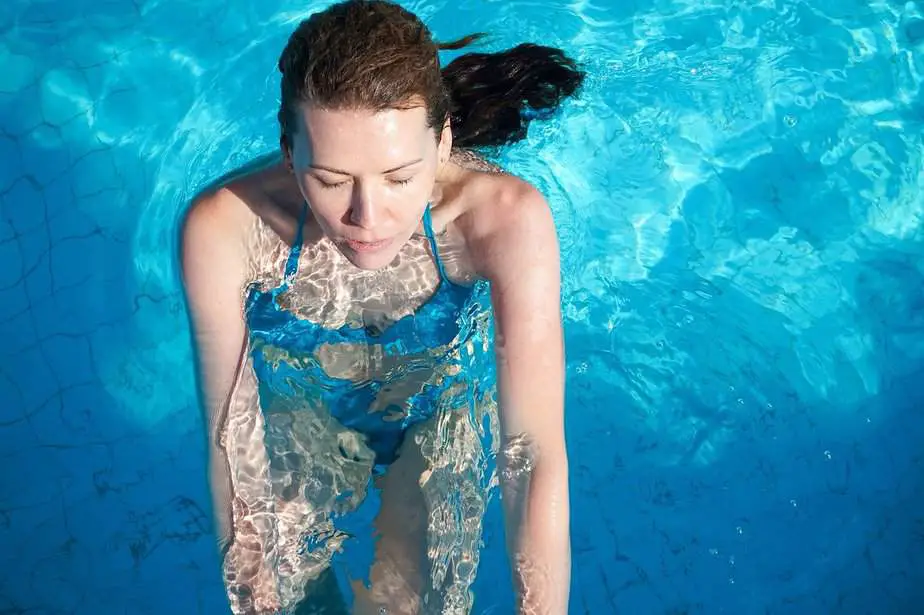Have you ever worn your bathing suit for a few months, only to one day find out that it has become so thin that it’s see-through and it’s now practically falling apart in your hands? It’s an eyebrow-raising moment, especially if you were expecting your bathing suit to last for years. Besides, aren’t swimsuits supposed to lose their elasticity over time, not disintegrate?
The reason your bathing suit is disintegrating is that it is made from a delicate stretchy fabric that requires special care. If it is exposed to chlorine or other chemicals, the chemicals must be rinsed off quickly to limit contact with your swimsuit. Failure to rinse these chemicals off fully, or in a timely manner, can result in your bathing suit eventually falling apart or even disintegrating.
Additionally, another issue is exposure to heat. When you are washing and drying your clothes, do so by hand. Do not rely on a washing machine or dryer as they can expose your swimsuit to heat. Even with a cold wash cycle, the spinning action can severely wear down your swimsuit. When washing by hand, stick with cold water and be very gentle when scrubbing it.
In this article, we will discuss how chlorine and heat can negatively affect your swimsuit and cause it to disintegrate over time. We will also provide some tips to help you select a durable, high-quality swimsuit in the first place, as well as how you should care for your swimwear.
Effects of chlorine

Chlorine is a chemical that is used in public pools, home pools, and spas. It keeps the water sterile by killing bacteria and preventing bacterial growth. Without chlorine in the water, your chances of getting sick and spreading illness goes through the roof. That said, there can also be too much chlorine in a pool as well.
Unfortunately, chlorine also has some side-effects, and the one most relevant to this article is that it can cause your swimwear to disintegrate, lose elasticity, and fade in color. It can also cause your hair to dry, your scalp to itch, as well as skin irritations if it is not rinsed off.
As you can see, chlorine is a necessary evil. The benefit it provides outweighs any downsides, so chlorine is not going to go away any time soon. What we can do is limit the damage that chlorine does to our swimwear (and our skin) by limiting how long we expose ourselves to it.
Thus, if you find your swimsuit disintegrating, take a look at your swimming habits. How much time are you spending in the pool, and how soon are you washing your swimsuit afterwards? Are you fully rinsing off all the chlorine? You may also need to buy swimwear that is more chlorine resistant, and we’ll get into that in another section.
Effects of heat

If your swimsuit is disintegrating, another culprit may be heat. Heated pools, such as hot tubs, steam rooms, saunas, and spas can cause your swimsuit to fall apart, especially when combined with chlorine and other chemicals.
These are not the only sources of heat that can damage your swimwear. The washing machine, dryer, an iron, even just washing your swimsuit by hand with hot water can cause it to shrink or otherwise lose its elasticity.
The general rule when it comes to washing your swimsuit is to wash with cold water only, wash it with your hands, and then leave it to air dry. Do not put it into any machine because the spinning or tumbling action can cause significant wear and tear that can reduce your swimsuit’s lifespan (even on a cold wash cycle or a gentle setting).
Effects of improper storage
Believe it or not, even how you store your swimsuit can affect how long it lasts. People who nonchalantly crumple up their swimsuit and toss it into their bag can expect wrinkles and creases at a minimum.
Even worse, if you have other gear like swim fins or goggles in the bag, they can rub against the swimsuit and wear it down. This is similar to how putting clothes in the washing machine can wear it down if there are zippers and buttons in the mix.
You should try your best to separate all of the various items into different compartments. You should also roll your swimwear up, even better if you roll it up inside a towel, to save space and ensure it’s protected against wrinkles and other items in the bag.
How to make your bathing suit last a long time
Pick the right swimwear
If your swimsuit is disintegrating after only a few months, then it’s likely that: A) you are not rinsing off all of the chlorine after swimming, B) your swimsuit is made of Lycra/Spandex, or both. If you want your swimsuit to last for years instead of only months, you need one that is made with the right fabric.
A chlorine-resistant fabric that swimmers recommend is 100% polyester. Don’t get a bathing suit made with a blended fabric, get a 100% polyester swimsuit.
This fabric is much more resistant against chlorine and heat, but that doesn’t mean you can slack on the maintenance. Continue to wash it in cold water by hand, avoid using machines, and your polyester swimsuit will retain its shape, color, and elasticity for much longer even when worn in chlorinated pools.
Take care of your swimwear
So we’ve already given some tips on how to take care of your swimwear, but this deserves its own section. Here are step-by-step instructions on how to wash and dry your swimsuit.
First, fill a wash basin or sink with cold water. Add a little bit of swimsuit detergent. We also recommend adding a tablespoon of white vinegar. This will act as a booster for the swimsuit detergent, and the vinegar will get rid of the chlorine smell.
Next, submerge your swimsuit in this cleaning solution. Let it soak for 30 minutes so that the detergent and vinegar can really get in there.
After the time is up, drain the water, and rinse the bathing suit with cold water. This ensures all of the bubbles are washed off, and any dirt or debris are rinsed off as well.
Resist the urge to wring the excess water out of the swimsuit. The twisting motion is very damaging to your swimsuit and you may stretch it out or even tear it. To squeeze the water out the gentle way, lay it on a dry towel, and then put another towel over it. Then you can step on the swimsuit (over the towels), and this will squeeze out the water out without twisting it.
Finally, it’s time to dry your swimsuit. Once again, resist the urge to hang it in direct sunlight. This seems intuitive, but the sun’s UV rays can also damage your bathing suit. Instead, dry it in a shaded, well-ventilated area. You can just lay it flat on a table or over a clothes drying rack. You can hang it on a line/hanger, but keep in mind that the clip/hanger can damage the shoulder straps.
To recap, you should limit the amount of time you expose your swimsuit to chlorine and heat. Try to get one with the right fabric, preferably 100% polyester. Remember to thoroughly rinse your swimsuit afterwards with cold water. Do not rely on machine washing or using a dryer to clean your swimsuit; do everything by hand and leave it to air dry. Following these steps will ensure your swimsuit will last longer and that it will never disintegrate again.


